COVID-19 Testing
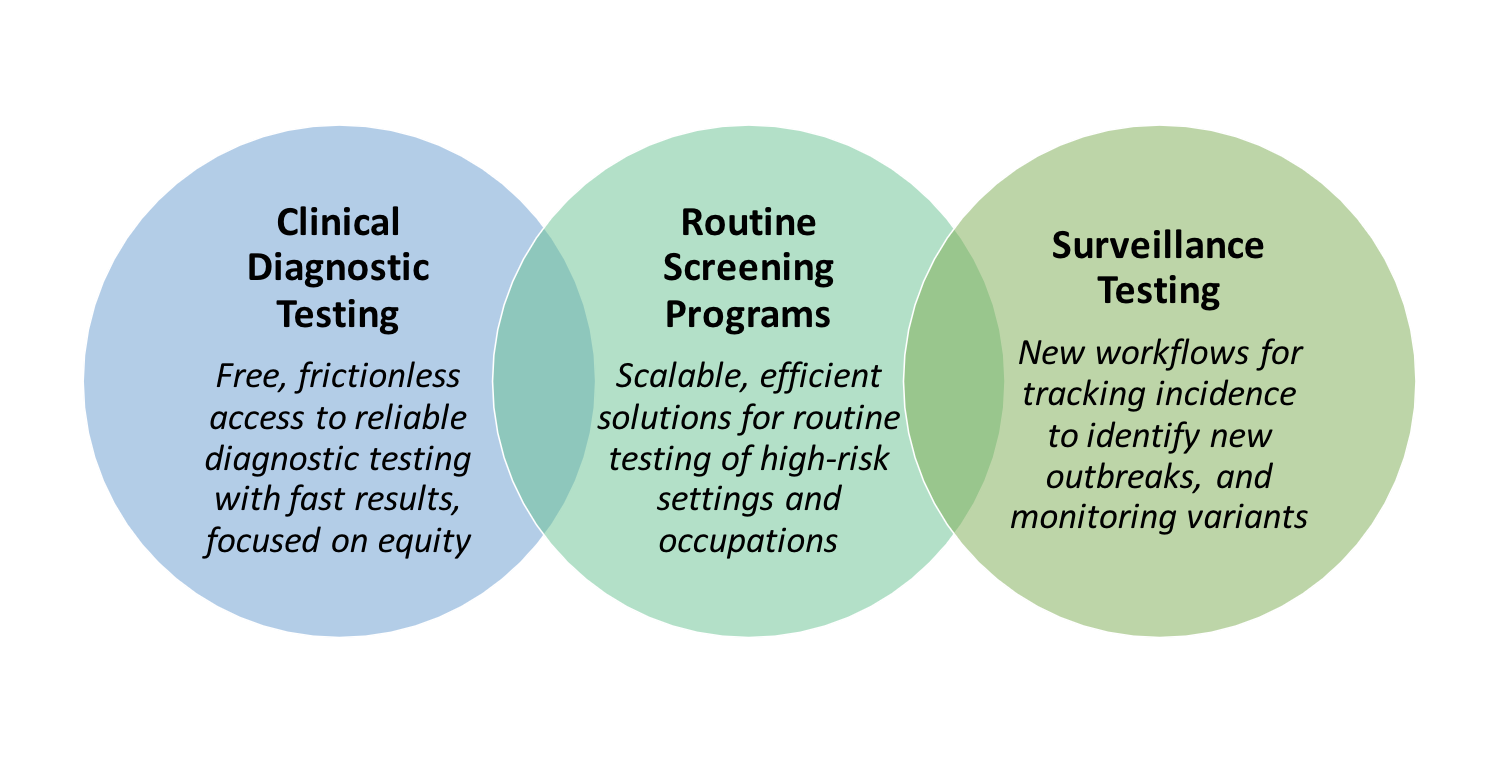
Overview
From early in the SARS-CoV-2 pandemic, Duke-Margolis understood the importance of widespread and efficient Covid-19 testing and how this would continue to be a major pillar in mitigation strategies even after the availability of vaccines. Within two weeks of the World Health Organization’s pandemic declaration, the Duke-Margolis Center for Health Policy published its first white paper stressing the importance of diagnostic testing in the prevention of large-scale outbreaks. Duke-Margolis has since continued to write about how testing can be made more widespread, accessible, and effective.
To date, the Center has released reports consisting of both public policy recommendations as well as practical considerations for facilities and localities considering implementing Covid-19 testing programs.
Funding for this work has come from gifts and grants from The Rockefeller Foundation, the Gordon and Betty Moore Foundation, the Alexandria Summit, and the Margolis Family Foundation.
Policy Papers
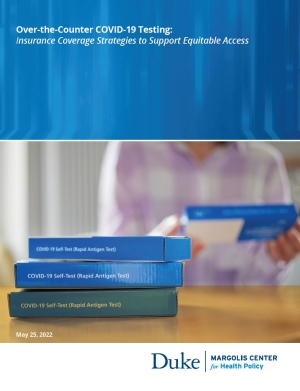
Over-the-Counter COVID-19 Testing: Insurance Coverage Strategies to Support Equitable Access
Katie Huber, Thomas Roades, Aparna Higgins, Mara Aspinall, Christina Silcox, & Mark McClellan
May 2022
This report describes the challenges and potential solutions related to health plan coverage of over-the-counter Covid-19 tests as a means of addressing the challenge of timely and appropriate testing access.
A National Decision Point: Effective Testing and Screening for Covid-19
Christina Silcox, David Anderson, Anna Zavodszky, Ethan Borre, Susan Dentzer, Mara G. Aspinall, and Mark McClellan (September 9, 2020)
This report introduces the framing used throughout our work regarding different purposes for testing, produces initial capacity estimates, uses modeling to show how frequent screening can reduce transmission, and makes risk-based estimates on the number of tests that would be required to screen populations in two high-risk settings (schools and nursing homes). The report also includes policy recommendations meant to increase test capacity, provide guidance, and reduce regulatory burden for screening and surveillance protocols.
Funded by The Rockefeller Foundation and the Margolis Family Foundation.
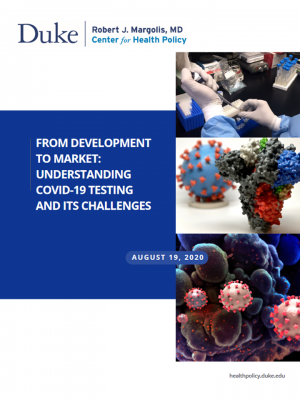
From Development to Market: Understanding COVID-19 Testing and Its Challenges
Monika Schneider, Susan Dentzer, Sarah Sheehan, Karley Whelan, Christina Silcox, Marianne Hamilton Lopez, Marta Wosińska, and Mark McClellan (August 19, 2020)
Amid the Covid-19 pandemic and a crisis over inadequate and delayed testing, this report describes Covid-19 testing methods and applications, the regulatory process for approving tests, how tests are paid for, and how access to testing is obtained. The report also highlights challenges that stakeholders are currently facing and will continue to confront in the coming months around Covid-19 testing.
Funded by the Gordon and Betty Moore Foundation.
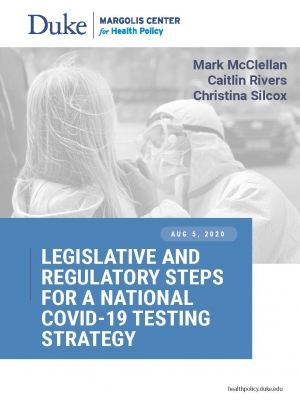
Legislative and Regulatory Steps for a National COVID-19 Testing Strategy
Mark McClellan, Caitlin Rivers, and Christina Silcox (August 5, 2020)
This report lays out a comprehensive approach to Covid-19 testing that separates diagnostic testing from routine screening tests to alleviate strain on the laboratory capacity that has suffered regional breakdowns in the past several months. This approach includes $75 billion in funding to allow rapid, less costly point-of-care (POC)/at-home testing as well as more effective contact tracing, isolation, and containment. This involves developing smarter testing, increasing testing capacity, widening the supply chain, tracing and isolation, reporting, and communicating.

Health Care Payment to Support COVID-19 Detection and Containment
Mark McClellan, Farzad Mostashari, and Tom Barker (May 1, 2020)
This report describes further payment supports for comprehensive and effective health care provider engagement in rapid case detection, management, and containment of the Covid-19 pandemic. Building on recent Centers for Medicare & Medicaid Services (CMS) actions, these payment reforms could be adopted individually or collectively to reinforce and support health care providers in developing various capabilities to help contain Covid-19.
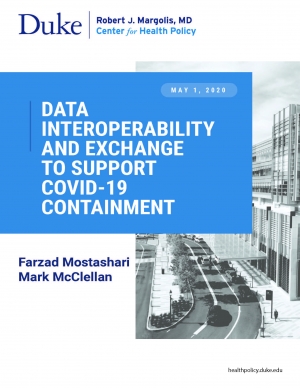
Data Interoperability and Exchange to Support COVID-19 Containment
Farzad Mostashari and Mark McClellan (May 1, 2020)
In response to difficulties public health agencies faced with routinely accessing critical data from other key participants in the Covid-19 containment effort, Duke-Margolis convened a multi-stakeholder working group to provide recommendations. This paper lists feasible, short-term steps to improve interoperability and exchange of key data for Covid-19 containment.

A National COVID-19 Surveillance System: Achieving Containment
Mark McClellan, Scott Gottlieb, Farzad Mostashari, Caitlin Rivers, and Lauren Silvis (April 7, 2020)
This report describes the features and capabilities of a national surveillance system to mitigate the current Covid-19 pandemic wave as well as to limit and suppress future outbreaks. Developing these capabilities in each state and region will enable the U.S. to move beyond extreme and disruptive physical isolation measures. The proposed Covid-19 surveillance system builds on existing models and principles of public health surveillance, but it recognizes that the transmissibility and virulence of Covid-19 require a much more substantial capacity for rapid detection and public health response.
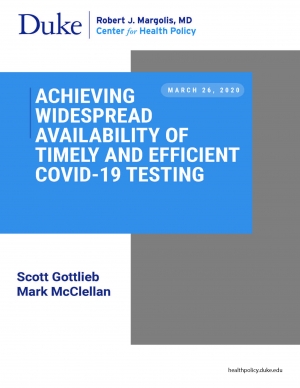
Achieving Widespread Availability of Timely and Efficient COVID-19 Testing
Mark McClellan, Scott Gottlieb, and Lauren Silvis (March 26, 2020)
This report released just weeks after the start of the pandemic describes recommendations for increasing Covid-19 diagnostic testing capacity in the United States. Steps from supporting innovation and speeding production of both tests and ancillary supplies to improving data reporting are outlined. The report also emphasizes the significance of investment in diagnostic testing capacity to the development of a robust national Covid-19 surveillance strategy, which will be necessary in the long term.
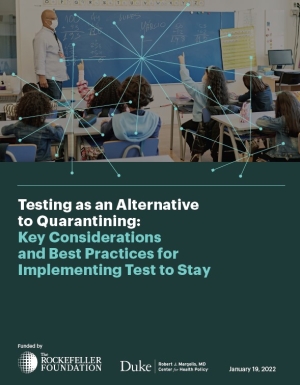
Testing as an Alternative to Quarantining: Key Considerations and Best Practices for Implementing Test to Stay
Andrea Thoumi, Thomas Roades, Christina Silcox, and Mark McClellan (January 19, 2022)
In this issue brief, we provide states considering Test to Stay programs in K-12 schools practical guidance on key technical and health equity strategies to inform planning, design, and implementation efforts. Under a Test to Stay program (also called a “close contact testing program”), certain close contacts of a person who tests positive for Covid-19 undergo repeated testing after an exposure and can stay in school as long as they continue to test negative. Preliminary evidence collected during the Delta wave shows Test to Stay can increase in-person attendance, minimize school-related disruption, increase access to testing, and address concerns regarding safety with in-person instruction. However, Test to Stay programs may produce unintended consequences unless programs address technical and equity considerations in the planning and design phases of program development. Potential unintended consequences include overburdening staff and exacerbating existing disparities among underfunded schools that lack sufficient staff, space, or tests to launch a Test to Stay program due to existing systemic inequities. Furthermore, similar to other mitigation strategies, ongoing monitoring of community transmission, Covid-19 case counts, and other social impacts is needed to reassess safety and respond to variants as they emerge.
Funded by The Rockefeller Foundation.
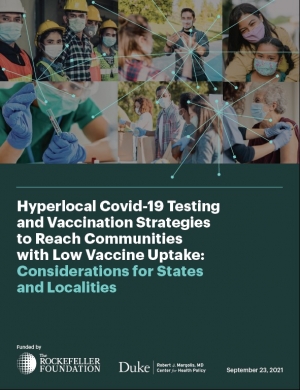
Hyperlocal Covid-19 Testing and Vaccination Strategies to Reach Communities with Low Vaccine Uptake
Andrea Thoumi, Kamaria Kaalund, Christina Silcox, Katie Greene, Nikhil Chaudhry, Jeremy Jacobs, Kirk Williamson, and Mark McClellan (September 22, 2021)
Hyperlocal strategies that build on local partnerships and public health capacity are needed to address disparities in testing and vaccination uptake, especially as Covid-19 variants increase in prevalence in the United States. Mass Covid-19 testing programs at schools and workplaces are increasing as the Delta variant spreads, but such efforts are unevenly distributed across the country. This paper provides practical guidance to state and local health officials to ensure Covid-19 diagnostic testing and vaccinations are equitably accessible and distributed among communities experiencing low vaccine uptake. We spotlight illustrative examples that show how states and communities can use existing infrastructure as a starting point and modify strategies to meet each community’s needs. These examples are informed by interviews with state and local health officials representing three states and two localities as well as practitioners representing two community-based models. We synthesized findings based on these interviews into three guiding principles: tailoring approaches; delivering services and communications that are culturally responsive, linguistically accessible, and Americans with Disability Act (ADA) accessible; and engaging community partners. Forward-looking strategies that stem from efforts outlined in this paper can increase state and local capacity to respond to ongoing and future public health crises in an equitable, timely, and community-responsive manner.
Funded by The Rockefeller Foundation.
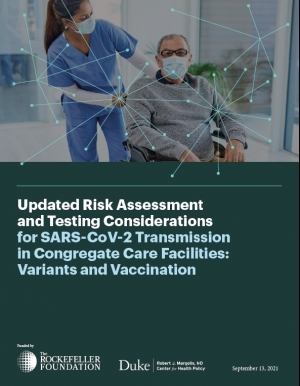
Risk Assessment and Testing Considerations for Reducing SARS-CoV-2 Transmission in Congregate Care Facilities
David Anderson, Courtney Van Houtven, Thomas Roades, Christina Silcox, and Mark McClellan (September 15, 2021)
This update to the original report discusses how the effort to vaccinate the elderly and health care workers has lowered the risk for both vaccinated and (to a lesser extent) unvaccinated residents of CCFs, as well as how the new Delta variant has increased the risk of transmission within a facility. The update also describes how new federal funding for testing as well as the increased supply of over-the-counter (OTC) tests has made implementing an effective testing program more straightforward. Finally, the report supplies examples of testing protocols that are adaptive to a community’s goals and underlying risk, and can and should be implemented to reduce community spread and protect the most vulnerable Americans.
Funded by The Rockefeller Foundation.

Three Steps to Smart COVID-19 Testing: A Guide for Employers
Michelle S. Franklin, Christina Silcox, Rebecca Ray, Mira Gill, Ethan Borre, Susan Dentzer, and Mark McClellan (May 24, 2021)
This guide is designed to help businesses and other organizations develop appropriate Covid-19 testing plans to enable safe operations during the pandemic. Testing is one of several important measures to help reduce the spread of the novel coronavirus and keep workers, customers, and others as healthy as possible. There is no ideal one-size-fits-all testing strategy. This guide walks you through the three key steps to shape a testing plan best suited to your organization’s needs: As facts on the ground change, so will your risk assessment. As such, you need to be prepared to change strategies over time – whether due to localized outbreaks or because most of your employees have been vaccinated. However, even as vaccines become more available, testing will remain important. Not everyone will seek vaccination, the vaccines do not guarantee complete protection from infection and spread, and new variants of the virus that causes Covid-19 may not be covered by available vaccines. This guide will help you identify a testing strategy that makes sense for your specific situation, understand the logistics involved in setting up that strategy, and provide examples of and advice on implementation.
Funded by The Rockefeller Foundation.
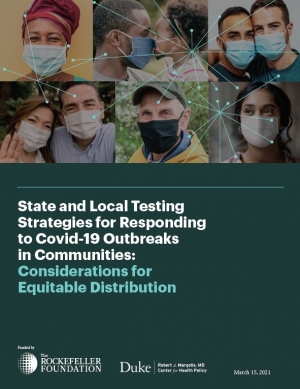
State and Local Testing Strategies for Responding to Covid-19 Outbreaks in Communities
Elaine F. H. Chhean, Katie Huber, Andrea Thoumi, Christina Silcox, Hemi Tewarson, David Anderson, and Mark McClellan (March 15, 2021)
This report aims to support state and local leaders in developing equitable testing strategies to quickly identify, prevent, and respond to Covid-19 outbreaks in communities most impacted by the Covid-19 pandemic, including communities of color. Low-income communities and communities of color face a disproportionate burden of Covid-19 cases, hospitalizations, deaths, and disability and yet have not received levels of testing that are commensurate to the disproportionate morbidity and mortality they experience. This document provides guidance and examples to identify communities most at risk, bring additional testing resources to those communities, and reduce barriers to testing.
Funded by The Rockefeller Foundation.

Risk Assessment and Testing Considerations for Reducing SARS-CoV-2 Transmission in Congregate Care and Policy Needs Brief add-on supplement
Courtney Van Houtven, David Anderson, Mira Gill, Anna M. Zavodszky, Christina Silcox, and Mark McClellan (January 25, 2021)
This document is meant to advise assisted living facilities and other congregate care facilities not subject to CMS testing requirements on how to assess risk in their setting and implement testing strategies accordingly. Recommendations are made regarding how vaccines may change overall risk and therefore testing needs, as well as addressing how testing can allow more generous visitor policies.
In connection with the report for facility administrators, a short “policy needs” document details measures that federal and state officials could take to facilitate testing in these facilities.
Funded by The Rockefeller Foundation.

Risk Assessment and Testing Protocols for Reducing SARS-CoV-2 Transmission in K-12 Schools
Caitlin Rivers, Christina Silcox, Christina Potter, Michelle Franklin, Rebecca Ray, Mira Gill, and Mark McClellan (October 14, 2020)
This report highlights practical considerations for screening and surveillance in schools to an audience of local public health officials and school administrators making these types of decisions. It discusses reasons for testing, gives advice on how to assess individual school risk, and gives practical advice around choosing a testing strategy based on that risk assessment.
Funded by The Rockefeller Foundation and the Margolis Family Foundation.

Supporting COVID-19 Response and Health System Resilience: What Needs to Be Done Next
Duke-Margolis Center for Health Policy (December 14, 2020)
This webinar aims to identify strategies for three key areas important for tackling the pandemic — improving testing and surveillance, implementing vaccine distribution, and ensuring health system resilience. The webinar identifies the key policy decisions that the federal government and incoming administration will wrestle with, as well as where states and the private sector will need to take action. Utilizing Duke-Margolis research in each area, the webinar includes presentations, panels, and fireside chats to identify the critical next steps in the public and private sector given this important policy window.
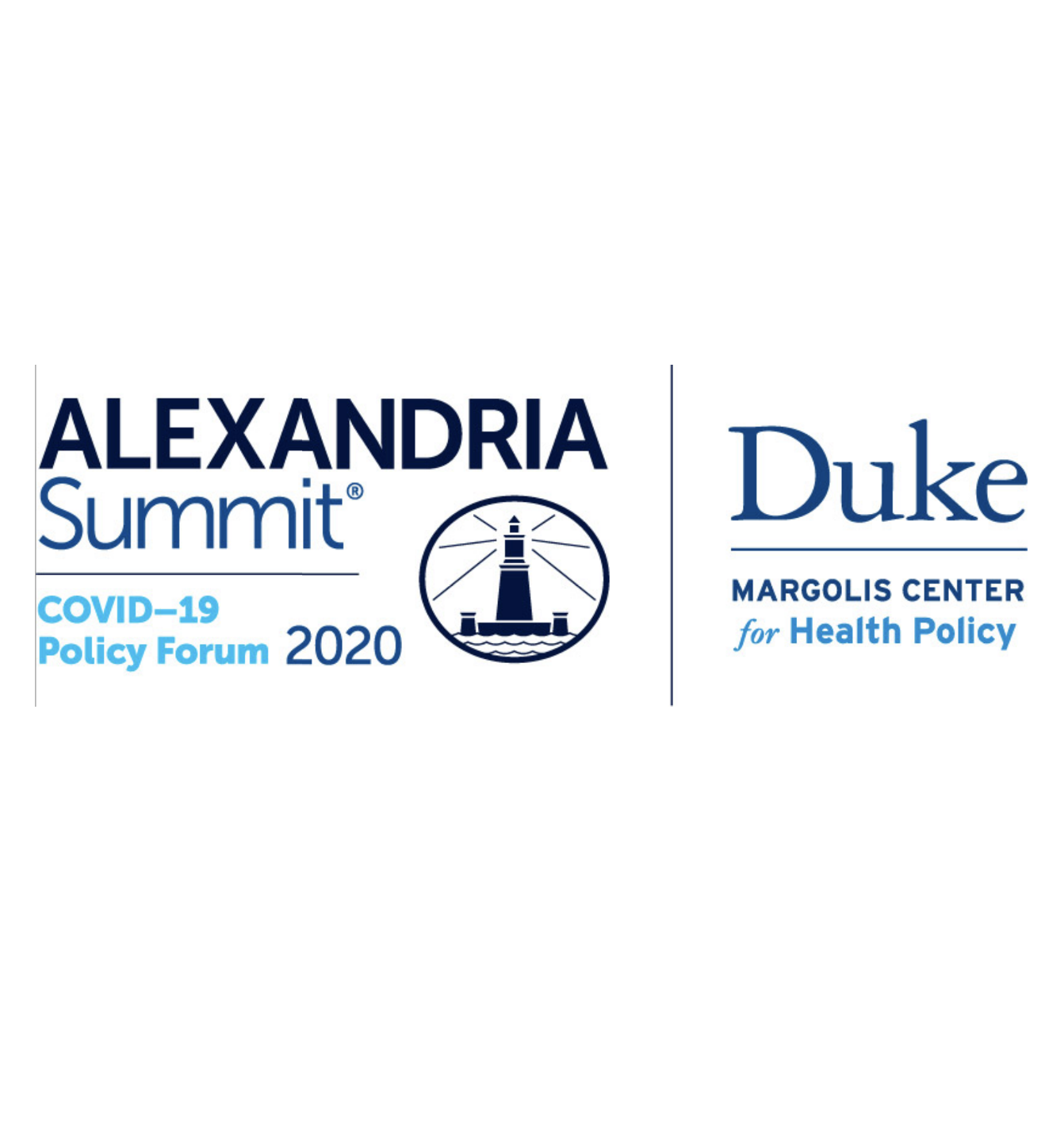
Duke-Margolis/Alexandria Summit Webinar: Reopening in an Era of COVID-19
Duke-Margolis Center for Health Policy and Alexandria Summit (June 23, 2020)
This webinar explores the issues, strategies, and policies for reopening the economy and public spaces in the absence of therapeutics and vaccines. The first session focuses on exploring safe back-to-work strategies for employers, in both higher and lower exposure-risk settings, with a focus on testing capacity, symptom tracking, and tracing and containment. The second session examines public health considerations and considerations for vulnerable populations where government action will likely need to augment private-sector efforts.
Duke-Margolis Research Team:

Michelle Scotton Franklin, PhD, RN, PMHNP-BC, FNP-BC, CNS
Margolis Core Faculty

Marianne Hamilton Lopez, PhD, MPA
Senior Research Director, Biomedical Innovation
Faculty Director of the Duke-Margolis Postdoctoral Associates & Affiliated Fellows Program
Adjunct Associate Professor
Senior Team Member
Margolis Core Faculty

Katie Huber, MPH
Policy Research Associate

Mark McClellan, MD, PhD
Director of the Duke-Margolis Institute for Health Policy
Robert J. Margolis, MD, Professor of Business, Medicine and Policy
Margolis Executive Core Faculty

Thomas Roades, MPP
Policy Research Associate

Gillian Sanders Schmidler, PhD
Deputy Director, Duke-Margolis Institute for Health Policy
Professor of Population Health Sciences, School of Medicine
Margolis Executive Core Faculty

Christina Silcox, PhD
Research Director, Digital Health
Adjunct Assistant Professor
Senior Team Member
Margolis Core Faculty

Courtney Van Houtven, PhD
Professor in Population Health Sciences
Margolis Core Faculty
